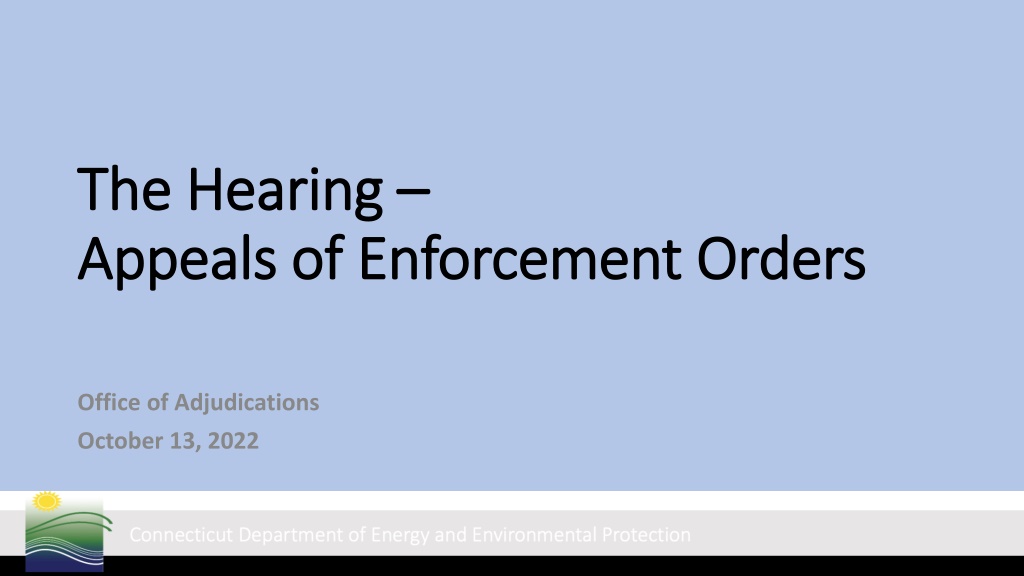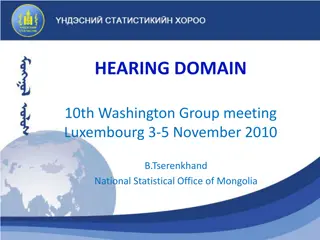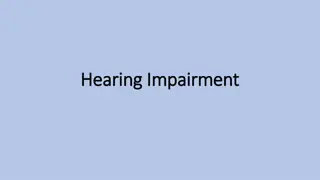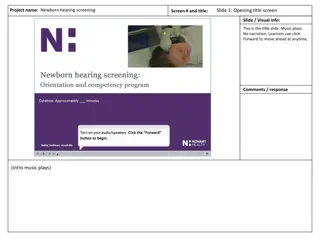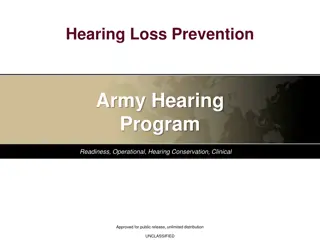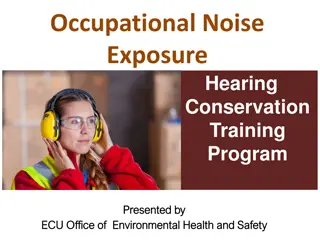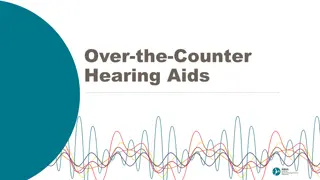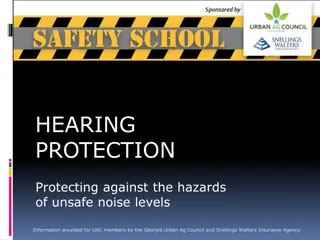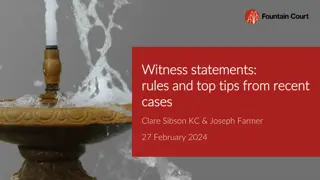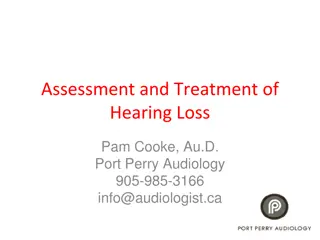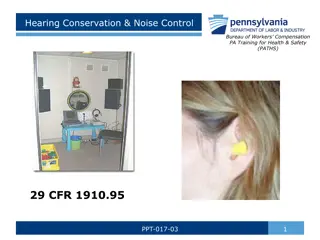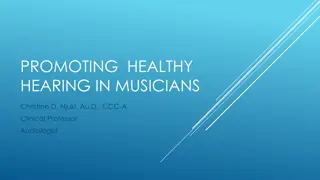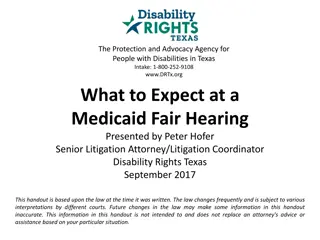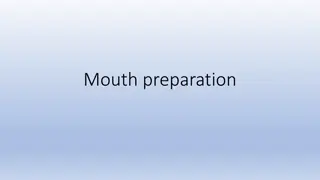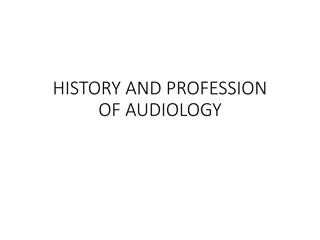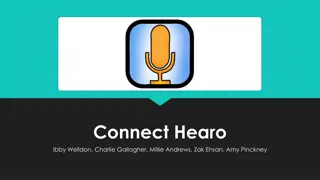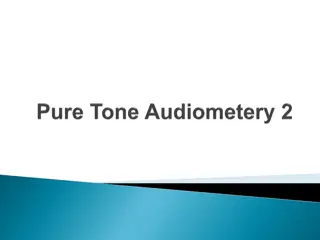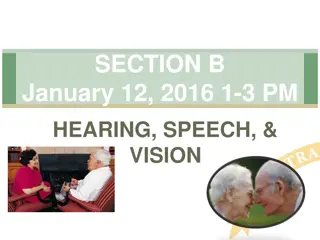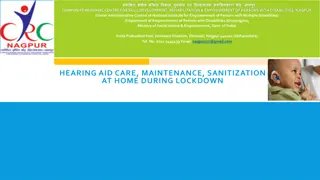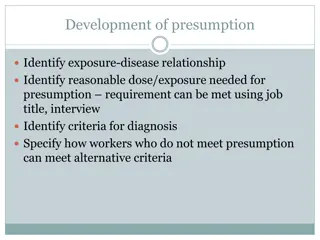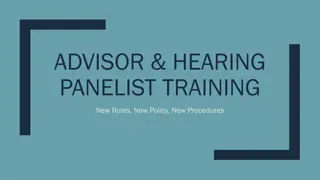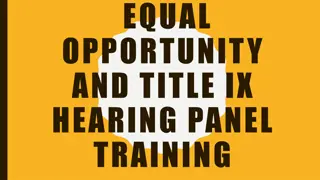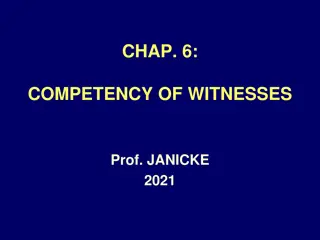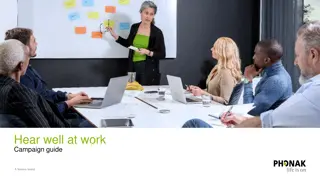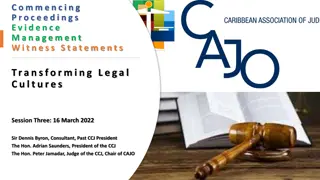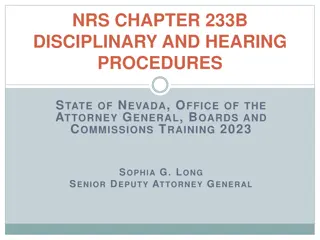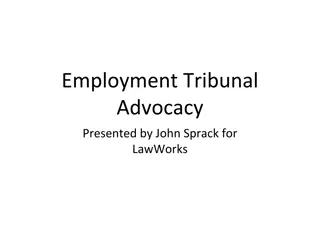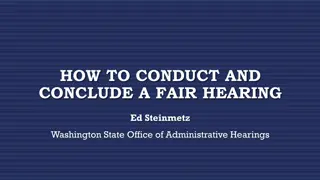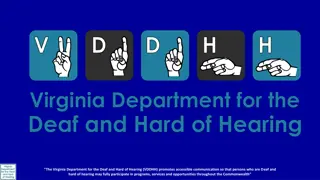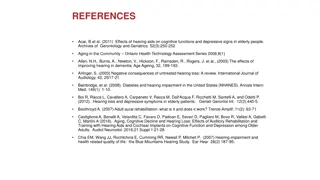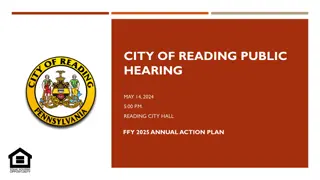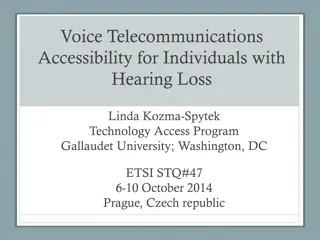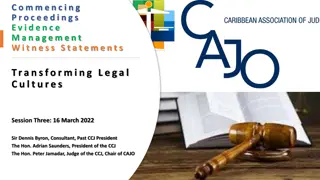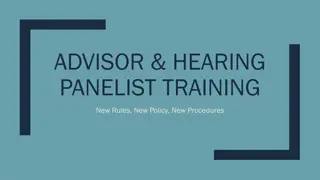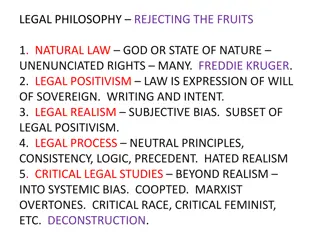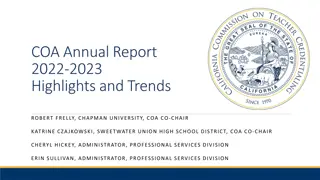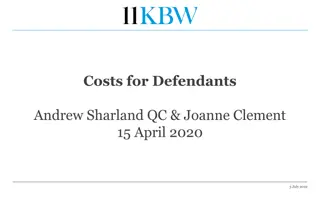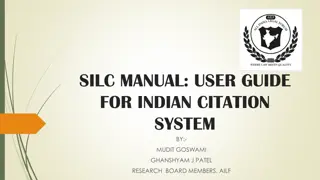Legal Hearing Procedures and Witness Preparation Guide
Understanding the legal hearing process is crucial for parties involved in enforcement/license cases. This guide covers the order of a hearing, burden of proof, witness preparation, and dealing with objections. Key steps include presenting evidence, cross-examination, rebuttals, and closing arguments. Deep Burden of Proof outlines the responsibility to prove violations. Witness preparation involves reviewing testimony, exhibits, and practicing with counsel. Expert witnesses should offer qualified opinions, and parties should address objections effectively.
Download Presentation

Please find below an Image/Link to download the presentation.
The content on the website is provided AS IS for your information and personal use only. It may not be sold, licensed, or shared on other websites without obtaining consent from the author. Download presentation by click this link. If you encounter any issues during the download, it is possible that the publisher has removed the file from their server.
E N D
Presentation Transcript
The Hearing The Hearing Appeals of Enforcement Orders Appeals of Enforcement Orders Office of Adjudications October 13, 2022
This Class This Class The Hearing in Enforcement/License Cases Burden of Proof Being a Witness Cross Examination & Re-Direct Objections Closing Arguments Post Hearing Filings and Process Final Decisions Appeals to Superior Court Questions
The Hearing The Hearing In every hearing, each party is given the chance to present a legal argument and offer relevant evidence to support position in the form of written documents or oral testimony provided under oath and to cross-examine other parties' witnesses. This process, which may take many hours or even several days, is each party's only chance to establish a complete hearing record upon which the hearing officer will base a written decision. Order of Hearing Opening Statements if requested Direct cases/Cross examination DEEP Respondent Intervening parties, Intervenors (limited) Re-Direct Rebuttal DEEP, as party with burden of proof, may request opportunity to rebut any evidence presented by other parties. If DEEP presents a rebuttal, other parties will also have chance to present a rebuttal case (however, case limited by scope of initial rebuttal case). Chance to introduce testimony of any witnesses reserved for rebuttal. Closing Statements if requested
DEEP Burden of Proof DEEP Burden of Proof Burden of Proof: Order/License Hearing - DEEP has the burden of proving that the order should be upheld and enforced or that the license should be revoked or suspended. In any hearing, the language of the statute or regulation will be the foundation of the case and DEEP has to prove how or why the pertinent statutes/regulations have been violated. Evidence should demonstrate the entire process, from start of enforcement investigation to conclusion. Evidence must establish elements of the order. Remember just saying Company ABC s activities violate the statutory and regulatory requirements is not enough, the evidence must demonstrate how this determination has been reached.
Being a Witness Being a Witness How to Prep for being a Witness direct case Review pre-filed testimony Review relevant exhibits to your testimony Review any public comment/concerns or supplemental information you want to present Work with counsel to prep practice can help make you feel more comfortable Expert Witness Pre-filed testimony will have been submitted and either objected to or admitted Expert opinion = evidence If qualified in field = expert Opinion that criteria met is NOT a legal opinion Making/Responding to Objections Rely on counsel, but if alone, speak up Connecticut Department of Energy and Environmental Protection
Cross Examination Cross Examination When you are being cross examined: Respond only to the questions asked of you Questions limited to scope of your direct testimony Make sure your direct testimony not mischaracterized Don t let opposing counsel put words in your mouth! Answer, don t speculate, if don t know, say so Remember: Your attorney or staff will have the opportunity for re-direct and can clarify responses on cross examination, provide an opportunity to include more information in your answers, etc. When you are cross examining witnesses: Prepare (review pre-filed testimony) Listen to direct testimony Review exhibits Remember the core elements that need to be proven in the hearing and follow up on any points presented that may challenge the core arguments Work with counsel
Re Re- -Direct Direct After cross examination, there will be an opportunity for re-direct If you are the witness on re-direct: Counsel or lead staff representative can follow up on questions that arose from the cross examination Re-direct must be within the scope of the cross Cannot explore new areas or follow up on arguments that were not brought up during cross examination Opportunity to further explain answers provided through cross examination If you are re-directing a witness: Listen to testimony carefully, write down notes/questions Can ask for a short break between cross examination and re-direct to review notes, discuss with counsel or staff (not the witness) and quickly prepare questions for re-direct
Questions from the Hearing Officer Questions from the Hearing Officer If the Hearing Officer has questions for a witness, she can ask them on the record These questions can stem for pre-filed testimony, testimony at the hearing, the site visit, information obtained from public comments/hearing or the exhibits A hearing officer may be asking questions to clarify the record, to ensure evidence is in the record, or to get more information Even if answer to question seems obvious Remember: It is the burden of the parties to present their case fully, Hearing Officers have no obligations to clarify record, etc. and while questions from the HO may occur, cannot rely on a Hearing Officer to ask questions if there is confusion, unclear record, etc. Cannot rely on Hearing Officer knowledge about issue; decision made on evidence in the record Counsel or staff will have an opportunity to re-direct the witness after any questions from the hearing officer
Making Objections Making Objections If Counsel is not assisting in the hearing You do not need to know the formal Rules of Evidence If it seems wrong, speak up Objections must be timely Common Grounds for objections Cross examination outside of scope of direct testimony Relevancy Calls for speculation Argumentative Hearsay Asked and Answered
Closing Arguments Closing Arguments Closing arguments are not common or required Any party can request closing arguments Generally, a closing argument is a persuasive summary of the key hearing evidence and party s arguments Objections usually not permitted during opening or closing arguments If a party presents a closing argument, the other party is not required to present closing argument - but would be offered the opportunity Cannot present new evidence or information during a closing argument Closing arguments are not evidence or considered as testimony
Post Hearing Directive Post Hearing Directive The Hearing has concluded now what? Hearing Officer issues a Post-Hearing Directive Sets schedule for receipt of Post- Hearing briefs Identifies issues to be addressed Addresses any other outstanding logistical issues
Post Hearing Briefs Post Hearing Briefs In licensing hearings, post hearing briefs are often not required or requested. Parties can request to file post hearing briefs and the hearing officer will rule on any such request, otherwise the Final Decision is based on the record as it stands at the close of the evidentiary hearing In enforcement hearings, post hearing briefs often are ordered by the Hearing Officer Post-hearing briefs include proposed findings of facts and proposed conclusions of law Formal brief v. memoranda form v. substance Re-state evidence and rebut arguments at hearing Don t ignore the negative Address the relevant statutes/regulations Address new issues raised at hearing Address public comments
Final Decisions & Appeals Final Decisions & Appeals The Hearing Officer issues Final Decision Any party aggrieved by Final Decision may appeal the case to the Superior Court 45 days from date Decision mailed (email = personal delivery) Final Decisions are issued via email to the parties and posted on our website www.ct.gov/deep/adjudications Staff may move forward with enforcement order upon issuance of Final Decision Unless motion for stay Attorney General s office defends DEEP at the Superior Court and through the appeal process. AG s office may ask for help in understanding the record, including your testimony Reviewing court must find the hearing officer made decision based on sufficient substantial evidence
The Administrative Record The Administrative Record Entire collection of documents filed in a case This includes documents that have marked as confidential and exhibits that have been marked as denied or withdrawn. Any member of the public can request the administrative record If there is an appeal: The Hearing Officer creates a certification of the record for the Superior Court The Hearing Officer provides the administrative record to the Assistant Attorney Generals representing DEEP and they will file the record with the Connecticut Superior Court
Need More Information? Need More Information? Communications with Hrg Officer/Office of Adjud www.ct.gov/deep/adjudications Hearings calendar The Hearing Process Policies, Procedures and Guidelines Public Participation in Hearings Intervention Mediation Forms and Samples Decisions Calendar CALENDAR of EVENTS - www.ct.gov/deep/calendar
